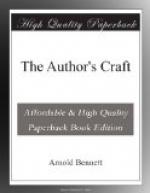V
Leaving the seductive minor question of ornamentation, I come lastly to the question of getting the semblance of life on to the page before the eyes of the reader—the daily and hourly texture of existence. The novelist has selected his subject; he has drenched himself in his subject. He has laid down the main features of the design. The living embryo is there, and waits to be developed into full organic structure. Whence and how does the novelist obtain the vital tissue which must be his material? The answer is that he digs it out of himself. First-class fiction is, and must be, in the final resort autobiographical. What else should it be? The novelist may take notes of phenomena likely to be of use to him. And he may acquire the skill to invent very apposite illustrative incident. But he cannot invent psychology. Upon occasion some human being may entrust him with confidences extremely precious for his craft. But such windfalls are so rare as to be negligible. From outward symptoms he can guess something of the psychology of others. He can use a real person as the unrecognisable but helpful basis for each of his characters.... And all that is nothing. And all special research is nothing. When the real intimate work of creation has to be done—and it has to be done on every page—the novelist can only look within for effective aid. Almost solely by arranging and modifying what he has felt and seen, and scarcely at all by inventing, can he accomplish his end. An inquiry into the career of any first-class novelist invariably reveals that his novels are full of autobiography. But, as a fact, every good novel contains far more autobiography than any inquiry could reveal. Episodes, moods, characters of autobiography can be detected and traced to their origin by critical acumen, but the intimate autobiography that runs through each page, vitalising it, may not be detected. In dealing with each character in each episode the novelist must for a thousand convincing details interrogate that part of his own individuality which corresponds to the particular character. The foundation of his equipment is universal sympathy. And the result of this (or the cause—I don’t know which) is that in his own individuality there is something of everybody. If he is a born novelist he is safe in asking himself, when in doubt as to the behaviour of a given personage at a given point: “Now, what should I have done?” And incorporating the answer! And this in practice is what he does. Good fiction is autobiography dressed in the colours of all mankind.




